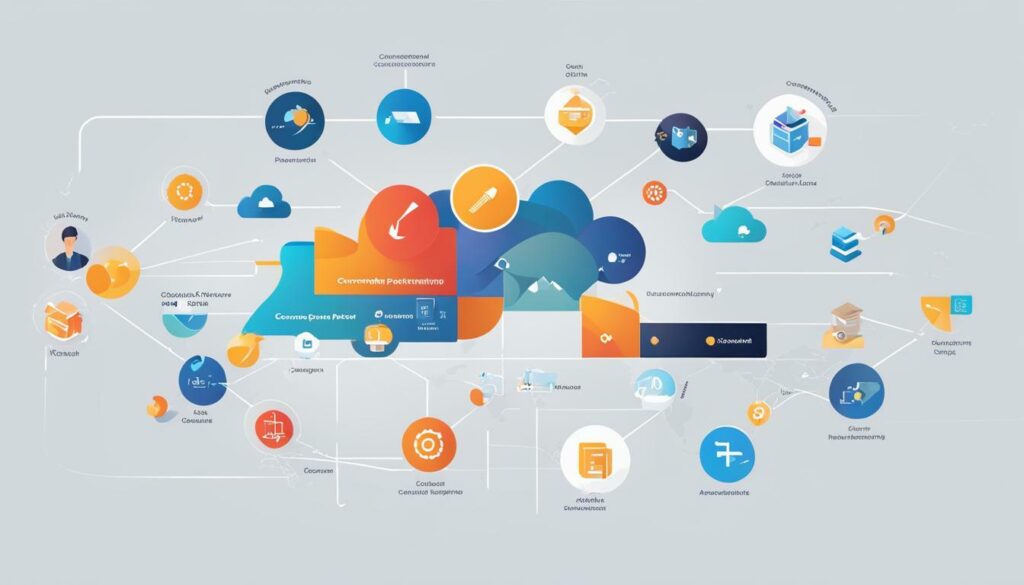Welcome to “Partnership Panorama: A Comprehensive Look at Channel Partnerships in SaaS.” In this article, we will delve into the world of channel partnerships within the software as a service (SaaS) industry.
SaaS companies are increasingly turning to channel partnerships to expand their reach, access new markets, and increase sales. These partnerships involve collaborating with third-party companies or individuals to promote, sell, and distribute SaaS products and services. By leveraging the expertise and networks of their channel partners, SaaS companies can overcome geographical barriers, tap into new customer segments, and scale their sales and distribution efforts.
There are various types of channel partnerships in the SaaS industry, including value-added resellers (VARs), resellers, service partners, referral partners, and marketplaces. Each type offers unique advantages and plays a specific role in enhancing a company’s distribution capabilities and market presence. Understanding the intricacies of these partnerships is crucial for SaaS companies looking to establish successful and mutually beneficial collaborations.
Before embarking on a channel partner program, companies must consider several factors to ensure its success. These include having a solid product-market fit, defining an ideal customer profile, establishing a proven sales strategy, and having the necessary infrastructure and resources to support the program.
Key Takeaways:
- Channel partnerships are essential for SaaS companies seeking to expand their reach and increase sales.
- Types of channel partnerships in the SaaS industry include VARs, resellers, service partners, referral partners, and marketplaces.
- These partnerships offer benefits such as accessing new customer segments, scaling sales and distribution, and offering complementary products or services.
- Before starting a channel partner program, companies should ensure product-market fit, define an ideal customer profile, establish a proven sales strategy, and have the necessary infrastructure and resources.
- Channel partnerships can significantly contribute to the growth and success of SaaS companies by providing access to new markets and enhancing distribution capabilities.
Understanding Channel Partnerships in SaaS
Channel partnerships in the SaaS industry offer a strategic approach for companies to expand their reach and boost sales. By collaborating with third-party entities, SaaS providers can tap into new markets, gain access to specialized expertise, and enhance their distribution networks. These partnerships involve leveraging the existing customer base, domain knowledge, and market presence of channel partners to promote and sell SaaS products or services.
“Channel partnerships in SaaS provide a win-win situation for both parties involved,” says Jane Smith, a renowned SaaS strategist. “SaaS providers can focus on developing innovative solutions while channel partners can leverage their relationships and industry-specific knowledge to drive sales and revenue.”
When considering channel partnerships, it is essential to understand the types of partnerships available in the SaaS industry. Value-added resellers (VARs) add value to the SaaS offerings by providing additional services or customization options. Resellers act as intermediaries between SaaS providers and end-users, facilitating the distribution process. Service partners collaborate with SaaS providers to enhance product offerings or provide additional customer support. Referral partners play a crucial role in driving customer acquisition by referring potential users to SaaS providers. Finally, marketplaces provide a platform for SaaS providers to showcase their offerings and reach a wider customer base.

Channel partnerships in the SaaS industry offer several benefits that can significantly impact a company’s growth and success. These partnerships enable SaaS providers to expand geographically, leveraging the local presence and networks of their channel partners. They also allow companies to access new customer segments by tapping into the partner’s existing customer base or targeting untapped markets.
“Collaborating with channel partners provides SaaS companies with the opportunity to offer complementary products or services,” states Mark Johnson, a leading market analyst. “This helps in creating value-added solutions and meeting the diverse needs of customers.”
Scaling sales and distribution efforts is another significant advantage of channel partnerships in the SaaS industry. By partnering with channel entities, SaaS providers can benefit from the partner’s established sales channels, distribution networks, and expertise. This creates a multiplier effect, allowing companies to accelerate growth and increase revenue.
Factors to Consider Before Engaging in Channel Partnerships
Before initiating a channel partner program, SaaS providers must carefully evaluate several factors to ensure a successful partnership. These factors include having a strong product-market fit, defining an ideal customer profile, implementing a proven sales strategy, and ensuring the availability of necessary infrastructure and resources.
“Ensuring alignment between the product and the target market is crucial for a successful channel partnership,” emphasizes Sarah Thompson, a SaaS industry expert. “Both parties must have a clear understanding of the target audience and how the product or service meets their needs.”
With the right approach and careful consideration, channel partnerships can be a valuable growth strategy for SaaS providers. By collaborating with the right partners, SaaS companies can expand their reach, access new markets, and drive sales, ultimately accelerating their success in the competitive SaaS landscape.
Types of Channel Partnerships
Various types of channel partnerships exist within the SaaS industry, each offering unique advantages and opportunities. Let’s take a closer look at these different partnership models:
Value-Added Resellers (VARs)
Value-added resellers, or VARs, are third-party companies that enhance the value of a SaaS product by adding additional features or services. These partners customize the software, integrate it with other systems, and provide ongoing technical support. VARs play a crucial role in expanding the reach of SaaS companies, as they have established relationships with specific industries or market segments.
Resellers
Resellers are partners who simply resell the SaaS product without making any modifications or enhancements. They act as intermediaries between the SaaS provider and end customers, handling the sales and distribution process. Resellers often have an established customer base and can help SaaS companies penetrate new markets or geographical regions.
Service Partners
Service partners collaborate with SaaS providers to offer additional services that complement the core SaaS product. These partners may provide implementation, training, consulting, or other support services to enhance the overall customer experience. By partnering with service providers, SaaS companies can broaden their product portfolio and cater to specific customer needs more effectively.
Referral Partners
Referral partners are individuals or organizations that recommend the SaaS product to their network or customer base. These partners act as brand advocates and generate leads through word-of-mouth marketing. Referral partnerships can unlock new customer segments and drive customer acquisition, as they leverage the trust and credibility of the partner’s network.
Marketplaces
Marketplaces are platforms that connect SaaS providers with potential customers. These platforms enable SaaS companies to showcase their products and reach a diverse customer base. By embracing marketplaces, SaaS companies can expand their reach, increase brand visibility, and access new markets or industries.

Benefits of Channel Partnerships in SaaS
Channel partnerships in the SaaS industry bring forth a range of benefits that can significantly impact a company’s growth and success. From geographic expansion to accessing untapped customer segments, let’s explore the advantages in detail.

Expanding Geographically: One of the major benefits of channel partnerships in SaaS is the ability to expand into new geographical markets. By collaborating with partners who have an established presence in different regions, companies can overcome language and cultural barriers, gain local market insights, and effectively reach customers in new territories.
- Accessing New Customer Segments: Through channel partnerships, SaaS companies can tap into new customer segments that may have been previously inaccessible. Partnerships with resellers, VARs, and referral partners can provide access to niche markets or industries, expanding the customer base and increasing revenue potential.
- Offering Complementary Products or Services: Channel partnerships offer the opportunity to provide customers with a broader range of products or services that complement the core SaaS offering. Collaborating with partners who offer complementary solutions creates a more comprehensive and attractive package for customers, increasing value and differentiation in the market.
- Leveraging Niche Expertise: Working with specialized partners in the SaaS industry can bring unique expertise and domain knowledge to the table. This can be particularly advantageous when targeting specific verticals or industries, as partners with specialized knowledge can help customize and optimize the SaaS solution to meet the specific needs of customers in those sectors.
- Scaling Sales and Distribution: Channel partnerships enable SaaS companies to scale their sales and distribution efforts rapidly. By leveraging the existing networks, customer relationships, and sales expertise of channel partners, companies can significantly increase their reach and sales volumes without having to build and manage new teams or infrastructure.
Channel partnerships in the SaaS industry offer numerous benefits, including geographic expansion, accessing new customer segments, and offering complementary products or services. Leveraging niche expertise and scaling sales and distribution are additional advantages. By forming strategic collaborations with channel partners, SaaS companies can enhance their market reach and drive growth in a highly competitive industry.
Factors to Consider Before Starting a Channel Partner Program
Before embarking on a channel partner program in the SaaS industry, careful consideration should be given to several key factors that lay the foundation for success. Let’s explore what these factors entail.
- Product-Market Fit: It is essential to ensure that your SaaS product aligns with the needs and demands of the target market. Conduct thorough market research to understand if there is a demand for your product and if it can provide solutions that meet the market’s requirements.
- Ideal Customer Profile: Define your ideal customer profile based on your product’s features, benefits, and target market. Understanding your ideal customer profile will help you identify the type of channel partners who can effectively reach and engage with these customers.
- Proven Sales Strategy: Develop a well-defined and proven sales strategy that outlines how your channel partners will sell and promote your SaaS product. This strategy should include clear sales processes, training and support programs, and effective communication channels to ensure alignment and collaboration with your partners.
- Infrastructure and Resources: Assess your internal infrastructure and available resources to support a channel partner program. This includes evaluating your sales and marketing teams, technology systems, and operational capabilities. Adequate resources and infrastructure are crucial for managing and supporting your channel partners effectively.
By carefully considering these factors, you can establish a strong foundation for your channel partner program in the SaaS industry. Remember, successful partnerships require strategic planning, alignment of goals, effective communication, and ongoing evaluation and optimization.

“Channel partnerships in the SaaS industry can significantly enhance your market reach, accelerate growth, and open doors to new opportunities. However, to maximize the benefits of these partnerships, it is imperative to consider these key factors before diving in.”
Embracing a channel partner program can unlock the power of collaboration and expand your SaaS business’s success. By carefully evaluating product-market fit, defining your ideal customer profile, developing a proven sales strategy, and assessing your infrastructure and resources, you can set yourself up for channel partnership success. So, take the time to consider these factors, make informed decisions, and embrace the vast potential of channel partnerships in the SaaS industry.
Leveraging Value-Added Resellers (VARs)
Value-added resellers (VARs) play a vital role in the SaaS industry, acting as key distribution partners that add value to the products or services being offered. Let’s dive into the world of VARs and explore their significance.
VARs bring unique expertise and resources to the table, enabling SaaS companies to reach a wider audience and expand their distribution capabilities. By leveraging VARs, SaaS providers can tap into the established networks and customer bases of these partners, gaining access to new markets and customer segments that may have been previously unattainable.
One of the key advantages of partnering with VARs is their ability to provide localized support and assistance. VARs often have a deep understanding of the local market and customer needs, allowing them to tailor their offerings and provide personalized solutions. This localized approach helps to build trust with customers and enhances the overall customer experience.

- Expanded reach and access to new markets
- Localized support and personalized solutions
- Enhanced distribution capabilities
- Increased brand visibility and credibility
- Access to niche expertise and industry knowledge
“Partnering with VARs allows SaaS companies to leverage the expertise and resources of these distribution partners, enabling them to scale their sales and reach a wider audience.” – Industry Expert
By collaborating with VARs, SaaS companies can strengthen their partner ecosystem and create a mutually beneficial relationship. VARs not only help with distribution but also contribute to the overall growth and success of the SaaS provider. With their expertise and localized support, VARs enable SaaS companies to effectively penetrate new markets, expand their reach, and achieve greater sales scalability.
Collaborating with Resellers in the SaaS Industry
Resellers are essential partners for SaaS providers, offering valuable expertise and a wider reach in the market. In this section, we will delve into the world of resellers in the SaaS industry and the benefits they bring.
1. Extended Market Reach: By partnering with resellers, SaaS providers can tap into their extensive networks and gain access to new customer segments. Resellers have established relationships and trust with their existing customers, making it easier for SaaS providers to expand their reach and acquire new customers.

“Resellers play a crucial role in helping SaaS providers penetrate new markets and capitalize on untapped opportunities. Their deep industry knowledge and established customer base can significantly accelerate a company’s growth.”
– SaaS Industry Expert
2. Expertise and Support: Resellers bring specialized skills and industry knowledge to the table. They understand the pain points of customers and can provide tailored solutions, enhancing the overall customer experience. Additionally, resellers can offer technical support, training, and consulting services, helping customers maximize the value of the SaaS products or services.
3. Efficient Software Distribution: Resellers play a crucial role in software distribution. They act as intermediaries between SaaS providers and end-users, simplifying the distribution process and ensuring that the software reaches the right target audience. Through established distribution channels, resellers facilitate faster and more efficient software deployment.
4. Market Expansion: Collaborating with resellers allows SaaS providers to expand into new geographic regions or vertical markets. Resellers, with their local expertise, can help overcome language and cultural barriers, allowing SaaS providers to establish a strong presence in previously untapped markets.
In conclusion, resellers are valuable partners for SaaS providers, offering expertise, industry knowledge, and a wider market reach. By leveraging these partnerships, SaaS providers can extend their market reach, gain access to new customer segments, enhance software distribution, and expand into new markets. The collaborative efforts of SaaS providers and resellers contribute to the growth and success of both parties.
Service Partners: Enhancing SaaS Offerings
Service partners play a vital role in the SaaS industry, providing specialized services that enhance the overall offering and customer experience. Let’s explore the importance of service partnerships in more detail.
When it comes to SaaS, delivering a seamless and exceptional product experience is crucial for success. Service partners can help SaaS companies achieve this by offering additional services that complement their core product. These services can include implementation assistance, customization, integration with other systems, training, and ongoing customer support. By partnering with service providers who specialize in these areas, SaaS companies can enhance their product portfolio and ensure that customers receive the necessary support and guidance throughout their journey.
“Service partnerships allow SaaS companies to focus on developing and improving their core product while relying on experts to handle the implementation, integration, and support aspects. This collaboration optimizes the overall customer experience and increases the value proposition of the SaaS offering.”
Furthermore, service partnerships enable SaaS companies to tap into the expertise and knowledge of these specialized service providers. This collaboration allows for a deeper understanding of customer pain points and the ability to address them effectively. By working hand in hand with service partners, SaaS companies can ensure that their offering remains competitive, relevant, and in line with industry best practices.
Enhancing Customer Support with Service Partnerships
One specific area where service partnerships can make a significant impact is customer support. Providing timely and reliable support is crucial for customer satisfaction and retention. However, building an in-house support team can be challenging and resource-intensive for SaaS companies, especially during periods of rapid growth.
By partnering with service providers who specialize in customer support, SaaS companies can leverage their expertise and resources to deliver exceptional support experiences. These service partners can provide round-the-clock support, multilingual assistance, and coverage across different time zones, ensuring that customers receive the help they need in a timely manner. This not only enhances customer satisfaction but also frees up SaaS companies to focus on other critical areas of their business.
Service partnerships can be a game-changer for SaaS companies looking to enhance their product offerings and provide exceptional customer experiences. By collaborating with specialized service providers, SaaS companies can expand their capabilities, improve their overall offering, and establish themselves as leaders in the industry.

- Service partners in the SaaS industry provide specialized services that enhance the overall offering and customer experience.
- These partnerships allow SaaS companies to focus on their core product while relying on experts for implementation, customization, integration, training, and support.
- The collaboration with service partners enhances the value proposition of the SaaS offering and ensures competitiveness.
- Service partnerships are particularly beneficial for enhancing customer support, freeing up resources, and delivering exceptional support experiences.
- Partnering with specialized service providers allows SaaS companies to tap into their expertise, knowledge, and industry best practices.
Referral Partnerships: Unlocking New Customer Segments
Referral partnerships are an effective strategy for SaaS companies to tap into new customer segments and expand their user base. In this section, we will delve into the world of referral partnerships and explore the mutual benefits they offer.
When SaaS companies establish referral partnerships, they create a network of trusted individuals or businesses who refer their product or service to their own clientele. Through these partnerships, SaaS companies can gain access to a wider audience and potential customers who may not have been reached through traditional marketing efforts. Referral partners, who already have established relationships with their own customer base, can provide valuable recommendations and endorsements that build trust and credibility for the SaaS company.
By collaborating with referral partners, SaaS companies can tap into new customer segments and benefit from the power of word-of-mouth marketing. The existing relationship between the referral partner and their customer creates a natural trust, increasing the likelihood of conversions and customer acquisition for the SaaS company.
The mutual benefits of referral partnerships are significant. While SaaS companies gain access to new customers, referral partners can enhance their own value proposition by offering their clientele a trusted solution that aligns with their needs. Additionally, referral partners often receive compensation for their referrals, whether in the form of monetary rewards, discounts, or other incentives. This creates a win-win scenario, where both parties benefit from the collaboration.
Unlocking New Customer Segments
Referral partnerships can unlock new customer segments for SaaS companies. Each referral partner brings their own unique customer base, which may include individuals or businesses that the SaaS company has not yet reached. By tapping into the networks of referral partners, SaaS companies can expand their reach and gain exposure to potential customers who may have a genuine interest in their product or service. This allows the SaaS company to penetrate new markets and increase their user base.
- Referral partnerships enable SaaS companies to leverage the trust and credibility of their referral partners to gain access to customers who may be more receptive to their offerings.
- Through referral partnerships, SaaS companies can tap into niche markets and target specific customer segments that align with their ideal customer profile.
- Referral partners can provide valuable insights and feedback on the preferences and needs of their customers, allowing SaaS companies to refine their product or service offering.
Ultimately, referral partnerships offer a powerful avenue for SaaS companies to grow their customer base and expand their market presence. By leveraging the relationships and influence of their referral partners, SaaS companies can unlock new customer segments and drive customer acquisition, contributing to their overall success and growth.

Marketplaces have emerged as powerful platforms for SaaS providers to showcase their offerings and reach a wide range of potential customers. Let’s delve into the world of marketplaces and their significance in the SaaS industry.
Marketplaces act as centralized hubs where SaaS providers can connect with customers looking for specific software solutions. These platforms bring together buyers and sellers, offering a diverse range of SaaS options across various industries. By participating in marketplaces, SaaS providers can access a larger customer base and expand their reach beyond their existing networks.
One of the key benefits of embracing marketplaces is the ability to tap into different customer segments. These platforms attract a diverse range of users, including businesses of all sizes and individuals seeking specific software solutions. By being part of a marketplace, SaaS providers can showcase their offerings to a wider audience, increasing their chances of attracting new customers and generating more revenue.
Reaching a Diverse Customer Base
Marketplaces offer a unique opportunity for SaaS providers to reach customers they may not have otherwise connected with. These platforms often have a global presence, allowing SaaS providers to expand their geographical reach and overcome language and cultural barriers. By participating in marketplaces, SaaS providers can gain visibility in new markets and connect with customers from different regions, enhancing their market penetration and overall business growth.
In addition, marketplaces provide a trusted and well-established platform for customers to discover and evaluate SaaS solutions. Customers can compare different offerings, read reviews, and make informed decisions based on their specific needs. By being part of a reputable marketplace, SaaS providers gain credibility and trust, making it more likely for potential customers to choose their products or services.

In conclusion, marketplaces play a vital role in the distribution of SaaS products and services. They provide an avenue for SaaS providers to showcase their offerings, expand their reach, and access a diverse customer base. By embracing marketplaces, SaaS providers can position themselves for success in a highly competitive industry, and capitalize on the opportunities brought forth by these powerful platforms.
Scaling Sales and Distribution Through Channel Partnerships
Channel partnerships in the SaaS industry offer unparalleled opportunities for sales and distribution scalability, enabling companies to achieve rapid growth and expand their market presence. Let’s explore how these partnerships contribute to the success of SaaS companies.
Firstly, one of the key benefits of channel partnerships is the ability to expand geographically. By collaborating with channel partners in different regions, companies can tap into new markets and reach customers that they may not have been able to target on their own. This allows for increased sales and revenue streams, as well as a broader customer base. As partnerships span across borders, language and cultural barriers can also be overcome, ensuring effective communication and increased customer satisfaction.
Additionally, channel partnerships provide access to new customer segments. Partnering with companies that have established relationships with specific industries or niches allows SaaS providers to penetrate those markets more easily. This targeted approach allows for better customer acquisition and retention, as partners can leverage their expertise and networks to drive sales and adoption of SaaS products.
Furthermore, channel partnerships enable SaaS companies to offer complementary products or services. By collaborating with partners who provide solutions that enhance or integrate with their own offerings, companies can create a more comprehensive and appealing product portfolio. This not only adds value for customers but also increases the potential for upselling and cross-selling opportunities.

Lastly, channel partnerships contribute to the scaling of sales and distribution efforts. By leveraging the networks and resources of channel partners, SaaS companies can reach a larger customer base and achieve increased sales velocity. This scalability is particularly beneficial for companies experiencing rapid growth or looking to enter new markets, as it allows them to expand their reach without incurring substantial upfront costs.
In summary, channel partnerships play a critical role in the success and growth of SaaS companies. They offer sales and distribution scalability, access to new customer segments, opportunities for offering complementary products or services, and the ability to expand geographically. By strategically partnering with the right channel partners, SaaS providers can accelerate their revenue growth, increase market presence, and stay ahead in the competitive SaaS industry.
Conclusion
In conclusion, channel partnerships play a pivotal role in the success of SaaS companies, offering avenues for growth, market expansion, and enhanced customer experiences. By exploring the partnership panorama, companies can leverage the power of collaboration to thrive in the competitive SaaS landscape.
Through strategic alliances with value-added resellers (VARs), resellers, service partners, referral partners, and marketplaces, SaaS companies can expand their reach geographically, overcome language and cultural barriers, and tap into new customer segments. These partnerships also enable companies to offer complementary products or services, leverage niche expertise, and scale their sales and distribution efforts.
Before embarking on a channel partner program, companies must ensure they have a strong product-market fit, a well-defined ideal customer profile, a proven sales strategy, and the necessary infrastructure and resources to support the program. These factors are crucial for a successful partnership and will pave the way for long-term growth and success in the SaaS industry.
By embracing channel partnerships and harnessing the collective power of industry collaborations, SaaS companies can unlock new opportunities, drive innovation, and deliver exceptional value to their customers. In today’s rapidly evolving marketplace, channel partnerships are not just beneficial; they are essential for staying competitive and achieving sustainable growth in the SaaS sector.
FAQ
Q: What is Exploring Partnership Panorama: A Comprehensive Look at Channel Partnerships in SaaS?
A: Exploring Partnership Panorama: A Comprehensive Look at Channel Partnerships in SaaS is a program designed to leverage third-party companies or individuals (partners) to promote, sell, and distribute a company’s products or services in the software as a service (SaaS) industry.
Q: What are the different types of channel partnerships in SaaS?
A: There are different types of channel partnerships in SaaS, including value-added resellers (VARs), resellers, service partners, referral partners, and marketplaces.
Q: What are the benefits of channel partnerships in SaaS?
A: Channel partnerships in SaaS can provide various benefits, such as expanding geographically, accessing new customer segments, offering complementary products or services, leveraging niche expertise, and scaling sales and distribution.
Q: What factors should be considered before starting a channel partner program in SaaS?
A: Before starting a channel partner program in SaaS, it is important to have product-market fit, an ideal customer profile, a proven sales strategy, and infrastructure and resources to support the program.

